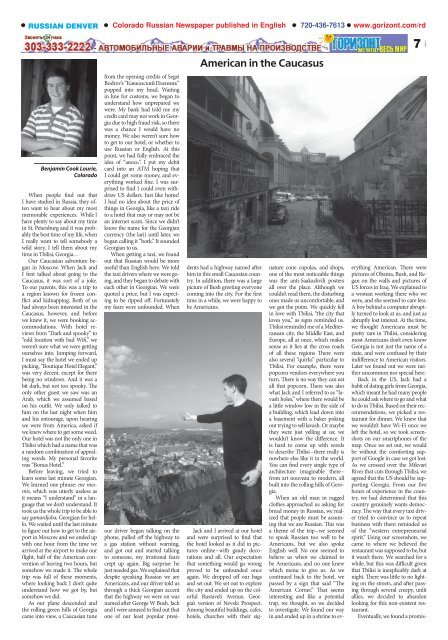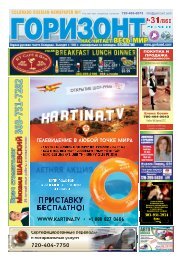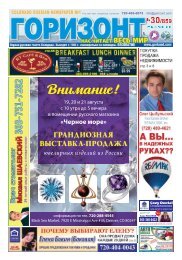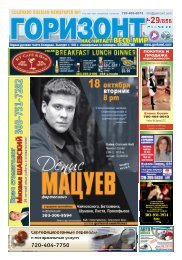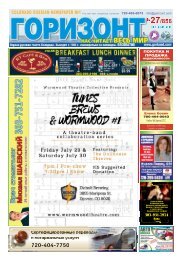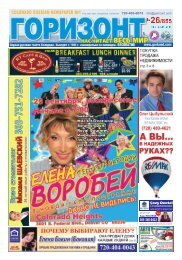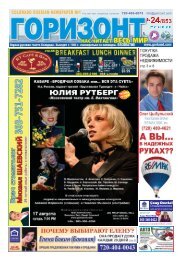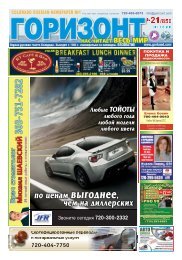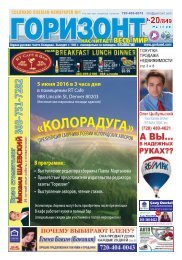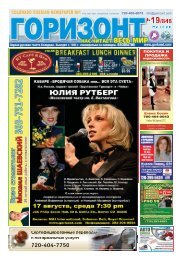Горизонт N45/826
Горизонт (газета) — (Gorizont англ. Horizon ) первая и наиболее влиятельная газета, издающаяся на русском языке в штатеКолорадо, США. Еженедельник, выходит по пятницам, формат Таблоид, 128 цветных и чернобелых страниц, распространяется в городах, составляющих метрополию Денвера (Большой Денвер), и в других населенных пунктах штата Колорадо от графства Саммит до графства Эль—Пасо. Полная электронная версия газеты «Горизонт» доступна в сети Интернет. Подробнее http://en.wikipedia.org/wiki/Gorizont_(newspaper)
Горизонт (газета) — (Gorizont англ. Horizon ) первая и наиболее влиятельная газета, издающаяся на русском языке в штатеКолорадо, США. Еженедельник, выходит по пятницам, формат Таблоид, 128 цветных и чернобелых страниц, распространяется в городах, составляющих метрополию Денвера (Большой Денвер), и в других населенных пунктах штата Колорадо от графства Саммит до графства Эль—Пасо. Полная электронная версия газеты «Горизонт» доступна в сети Интернет. Подробнее http://en.wikipedia.org/wiki/Gorizont_(newspaper)
You also want an ePaper? Increase the reach of your titles
YUMPU automatically turns print PDFs into web optimized ePapers that Google loves.
RUSSIAN DENVER<br />
Benjamin Cook Lourie,<br />
Colorado<br />
When people find out that<br />
I have studied in Russia, they often<br />
want to hear about my most<br />
memorable experiences. While I<br />
have plenty to say about my time<br />
in St. Petersburg and it was probably<br />
the best time of my life, when<br />
I really want to tell somebody a<br />
wild story, I tell them about my<br />
time in Tbilisi, Georgia…<br />
Our Caucasian adventure began<br />
in Moscow. When Jack and<br />
I first talked about going to the<br />
Caucasus, it was sort of a joke.<br />
To our parents, this was a trip to<br />
a region known for frozen conflict<br />
and kidnapping. Both of us<br />
had always been interested in the<br />
Caucasus, however, and before<br />
we knew it, we were booking accommodations.<br />
With hotel reviews<br />
from “Dark and spooky” to<br />
“odd location with bad Wifi,” we<br />
weren’t sure what we were getting<br />
ourselves into. Jumping forward,<br />
I must say the hotel we ended up<br />
picking, “Boutique Hotel Elegant,”<br />
was very decent, except for there<br />
being no windows. And it was a<br />
bit dark, but not too spooky. The<br />
only other guest we saw was an<br />
Arab, which we assumed based<br />
on his outfit. We only talked to<br />
him on the last night when him<br />
and his entourage, upon hearing<br />
we were from America, asked if<br />
we knew where to get some weed.<br />
Our hotel was not the only one in<br />
Tbilisi which had a name that was<br />
a random combination of appealing<br />
words. My personal favorite<br />
was “Bonus Hotel.”<br />
Before leaving, we tried to<br />
learn some last minute Georgian.<br />
We learned one phrase: me mesmis,<br />
which was utterly useless as<br />
it means “I understand” in a language<br />
that we don’t understand. It<br />
took us the whole trip to be able to<br />
say gamardjoba, Georgian for hello.<br />
We waited until the last minute<br />
to figure out how to get to the airport<br />
in Moscow and we ended up<br />
with one hour from the time we<br />
arrived at the airport to make our<br />
flight, half of the American convention<br />
of leaving two hours, but<br />
somehow we made it. The whole<br />
trip was full of these moments,<br />
where looking back I don’t quite<br />
understand how we got by, but<br />
somehow we did.<br />
As our plane descended and<br />
the rolling green hills of Georgia<br />
came into view, a Caucasian tune<br />
Colorado Russian Newspaper published in English 720-436-7613 www.gorizont.com/rd<br />
from the opening credits of Segei<br />
Bodrov’s “Кавказский Пленник”<br />
popped into my head. Waiting<br />
in line for customs, we began to<br />
understand how unprepared we<br />
were. My bank had told me my<br />
credit card may not work in Georgia<br />
due to high fraud risk, so there<br />
was a chance I would have no<br />
money. We also weren’t sure how<br />
to get to our hotel, or whether to<br />
use Russian or English. At this<br />
point, we had fully embraced the<br />
idea of “авось”. I put my debit<br />
card into an ATM hoping that<br />
I could get some money, and everything<br />
worked fine. I was surprised<br />
to find I could even withdraw<br />
US dollars. Just like home!<br />
I had no idea about the price of<br />
things in Georgia, like a taxi ride<br />
to a hotel that may or may not be<br />
an internet scam. Since we didn’t<br />
know the name for the Georgian<br />
currency (the lari) until later, we<br />
began calling it “bork.” It sounded<br />
Georgian to us.<br />
When getting a taxi, we found<br />
out that Russian would be more<br />
useful than English here. We told<br />
the taxi drivers where we were going,<br />
and they began to debate with<br />
each other in Georgian. We were<br />
quoted a price, but I was expecting<br />
to be ripped off. Fortunately<br />
my fears were unfounded. When<br />
American in the Caucasus<br />
our driver began talking on the<br />
phone, pulled off the highway to<br />
a gas station without warning,<br />
and got out and started talking<br />
to someone, my irrational fears<br />
crept up again. Big surprise: he<br />
just needed gas. We explained that<br />
despite speaking Russian we are<br />
Americans, and our driver told us<br />
through a thick Georgian accent<br />
that the highway we were on was<br />
named after George W Bush. Jack<br />
and I were amused to find out that<br />
one of our least popular presidents<br />
had a highway named after<br />
him in this small Caucasian country.<br />
In addition, there was a large<br />
picture of Bush greeting everyone<br />
coming into the city. For the first<br />
time in a while, we were happy to<br />
be Americans.<br />
7<br />
Jack and I arrived at our hotel<br />
and were surprised to find that<br />
the hotel looked as it did in pictures<br />
online – with gaudy decorations<br />
and all. Our expectation<br />
that something would go wrong<br />
proved to be unfounded once<br />
again. We dropped off our bags<br />
and set out. We set out to explore<br />
the city and ended up on the colorful<br />
Rustaveli Avenue, Georgia’s<br />
version of Nevski Prospect.<br />
Among beautiful buildings, cafes,<br />
hotels, churches with their signature<br />
cone cupolas, and shops,<br />
one of the most noticeable things<br />
was the anti-Saakashvili posters<br />
all over the place. Although we<br />
couldn’t read them, the disturbing<br />
ones made us uncomfortable, and<br />
we got the point. We quickly fell<br />
in love with Tbilisi, “the city that<br />
loves you,” as signs reminded us.<br />
Tbilisi reminded me of a Mediterranean<br />
city, the Middle East, and<br />
Europe, all at once, which makes<br />
sense as it lies at the cross roads<br />
of all these regions There were<br />
also several “quirks” particular to<br />
Tbilisi. For example, there were<br />
popcorn vendors everywhere you<br />
turn. There is no way they can eat<br />
all that popcorn. There was also<br />
what Jack and I referred to as “lavash<br />
holes,” where there would be<br />
a little window low in the side of<br />
a building, which lead down into<br />
a basement with a baker poking<br />
out trying to sell lavash. Or maybe<br />
they were just yelling at us; we<br />
wouldn’t know the difference. It<br />
is hard to come up with words<br />
to describe Tbilisi – there really is<br />
nowhere else like it in the world.<br />
You can find every single type of<br />
architecture imaginable there –<br />
from art nouveau to modern, all<br />
built into the rolling hills of Georgia.<br />
When an old man in ragged<br />
clothes approached us asking for<br />
bread money in Russian, we realized<br />
that people must be assuming<br />
that we are Russian. This was<br />
a theme of the trip – we seemed<br />
to speak Russian too well to be<br />
Americans, but we also spoke<br />
English well. No one seemed to<br />
believe us when we claimed to<br />
be Americans, and no one knew<br />
which menu to give us. As we<br />
continued back to the hotel, we<br />
passed by a sign that said “The<br />
American Corner.” That seems<br />
interesting and like a potential<br />
trap, we thought, so we decided<br />
to investigate. We found our way<br />
in and ended up in a shrine to everything<br />
American. There were<br />
pictures of Obama, Bush, and Regan<br />
on the walls and pictures of<br />
US forces in Iraq. We explained to<br />
a woman working there who we<br />
were, and she seemed to care less.<br />
A boy behind a computer abruptly<br />
turned to look at us, and just as<br />
abruptly lost interest. At the time,<br />
we thought Americans must be<br />
pretty rare in Tbilisi, considering<br />
most Americans don’t even know<br />
Georgia is not just the name of a<br />
state, and were confused by their<br />
indifference to American visitors.<br />
Later we found out we were neither<br />
uncommon nor special here.<br />
Back in the US, Jack had a<br />
habit of dating girls from Georgia,<br />
which meant he had many people<br />
he could ask where to go and what<br />
to do in Tbilisi. Based on their recommendations,<br />
we picked a restaurant<br />
for dinner. We knew that<br />
we wouldn’t have Wi-Fi once we<br />
left the hotel, so we took screenshots<br />
on our smartphones of the<br />
map. Once we set out, we would<br />
be without the comforting support<br />
of Google in case we got lost.<br />
As we crossed over the Mtkvari<br />
River that cuts through Tbilisi, we<br />
agreed that the US should be supporting<br />
Georgia. From our five<br />
hours of experience in the country,<br />
we had determined that this<br />
country genuinely wants democracy.<br />
The way that every taxi driver<br />
tried to convince us to repeat<br />
business with them reminded us<br />
of the “western entrepreneurial<br />
spirit.” Using our screenshots, we<br />
came to where we believed the<br />
restaurant was supposed to be, but<br />
it wasn’t there. We searched for a<br />
while, but this was difficult given<br />
that Tbilisi is inexplicably dark at<br />
night. There was little to no lighting<br />
on the streets, and after passing<br />
through several creepy, unlit<br />
allies, we decided to abandon<br />
looking for this non-existent restaurant.<br />
Eventually, we found a promis-


